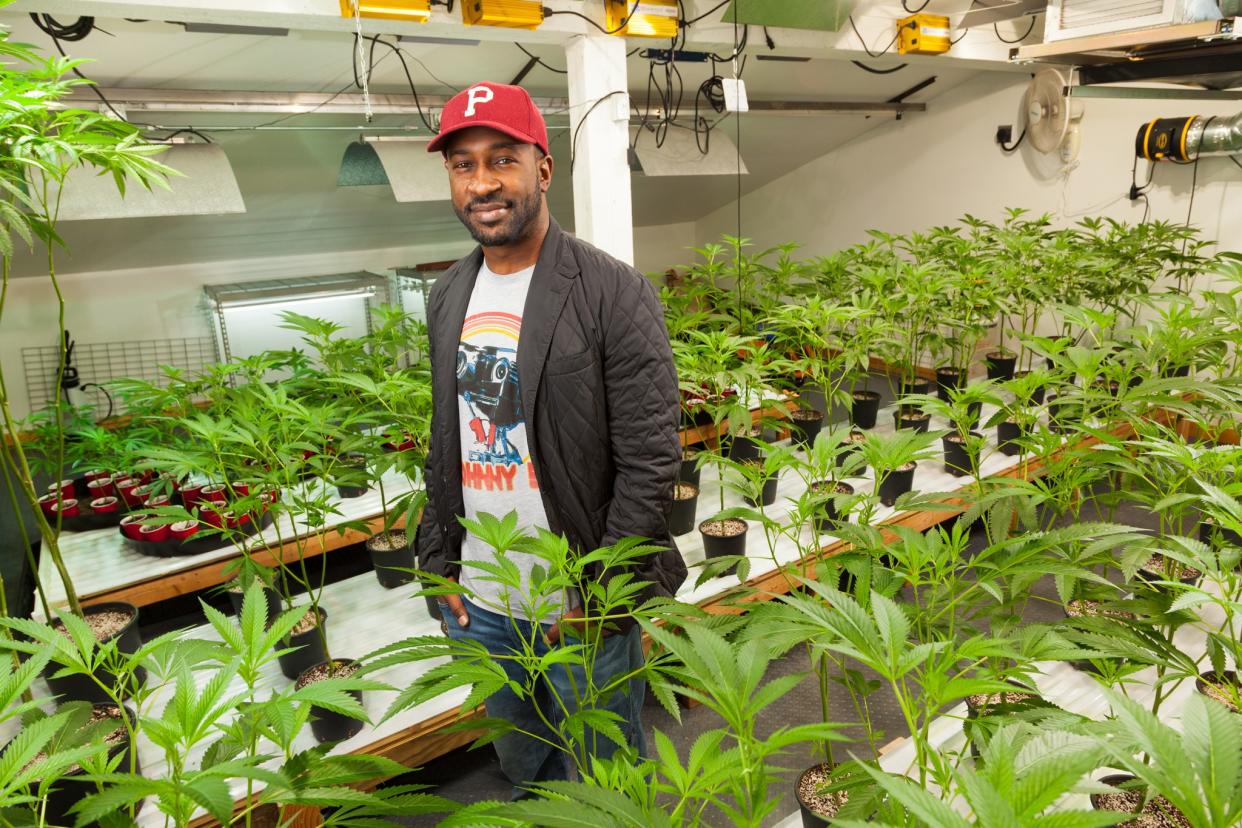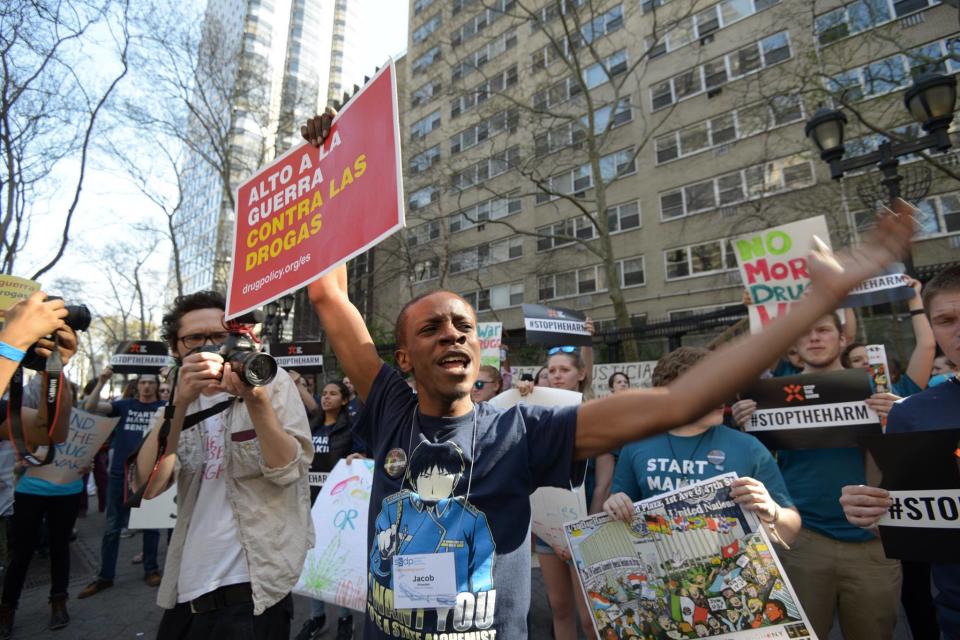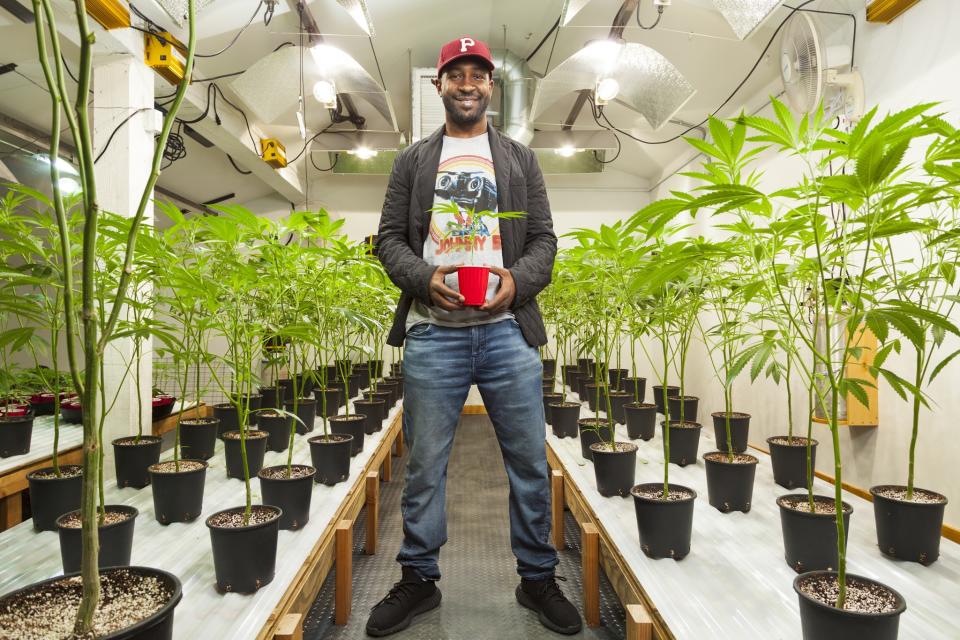For African-American families hit hard by the war on drugs, pot comes out of the shadows, but slowly

Jesce Horton still remembers the advice his father often imparted to him while he was growing up.
“Don’t talk back to police,” for example. Or, “Don’t reach for your wallet.”
Marijuana, said the 34-year-old Horton, was always a big part of those conversations. “It was something that can be used to hurt [you], to ruin your life.”
For Horton, who grew up mostly in Virginia and South Carolina, this warning was more than just a hypothetical. His father had spent time in prison for a marijuana-related charge, and the consequences of that experience weighed heavily on his family.
According to an exclusive Yahoo News/Marist Poll, 86 percent of African-Americans support legalizing marijuana for medical use, while 53 percent support legalizing it for recreational use — percentages consistent with overall national opinion. But for African-American families, for whom both religion and the devastating impact of the war on drugs wield strong influence, warming up to weed has been a bit more complicated.
“Black parents in this country have long sort of had ‘the talk’ and had to instill in their children that what may be to other kids [just a] youthful indiscretion can have dire consequences for them, given the climate and the context of their lives,” said Alyssa Aguilara, co-executive director of Vocal-NY, a grassroots organization that advocates for low-income communities affected by HIV/AIDS, the war on drugs and mass incarceration throughout New York state.
James L. Taylor, director of the African-American studies program at the University of San Francisco, studied the attitudes toward legalization of African-American voters in California as one of the co-authors of the book “Something’s in the Air: Race, Crime, and the Legalization of Marijuana.”

“Contrary to what many people might perceive in pop culture and mass media, African Americans are very conservative in the state of California on the issue of legal marijuana — at least African American voters,” who, Taylor points out, are not necessarily representative of the entire community. “Those who tend to turn out and vote are middle class, bourgeois. Voters tend to be affiliated with black religious organizations.”
Overall, Taylor found that religion, “more than anything, tends to shape attitudes around marijuana legalization.”
That was certainly the case for Jacob Plowden, whose Southern Baptist family generally viewed weed as a taboo topic as he was growing up in Virginia Beach, Va., and later New York City.
“You smoke, you’re going to hell,” Plowden said of his mother’s views on marijuana. “If you do drugs, you’re obviously a bad person.”
Even on his father’s side of the family, which was less religious, if anyone was using marijuana, they certainly didn’t talk about it. In addition to their religious beliefs, Plowden’s family was acutely aware that marijuana was illegal.
For his parents’ generation, weed “was one of those things that you stayed away from because you didn’t want the connotation of being a drug user or … [affiliated with a] criminal element.”

By the time Plowden was born in 1991, marijuana had become a source of immense strife within the black community, with young black men in particular being incarcerated in disproportionate numbers owing to the war on drugs.
Since he was a kid, every time Plowden left the house, he said, his mom would warn him, “Remember, you’re black.”
“She still says that,” said Plowden, now 26, laughing as he repeats his mother’s three-word mantra meant to urge caution in virtually any situation, including those involving marijuana. “Remember, you’re black.”
Despite their parents’ warnings, both Plowden and Horton experimented with marijuana and found it beneficial as well as enjoyable. For Plowden, it soothed the migraines and insomnia he’d suffered ever since a major concussion at 12. For Horton, it helped him focus on schoolwork.
“I think I had some form of ADD when I was younger, and it was just really hard for me to sit down and study that math problem,” said Horton. “But when I started consuming cannabis, things really changed a lot academically for me.” Marijuana advocates cite anecdotal evidence of people self-medicating with pot for attention-deficit problems, but the National Institute on Drug Abuse adheres to the mainstream view that the drug is not conducive to academic achievement.
Horton credits marijuana with helping him earn a degree in industrial engineering from Florida State University. But at home, it remained a source of tension between Horton and his parents.
Horton said his father “used to drug-test me in high school.”

“I would get home and my mom would be trying to look in my eyes to see if I was smoking,” he said. “It was really bad. We had a really bad relationship for a while just because of weed.”
Their fears were hardly unwarranted. Before he became involved in Oregon’s legal cannabis industry more than four years ago, Horton had been arrested three times for marijuana possession.
Horton compares the prevalence of marijuana arrests in the black community to cancer, in that “a lot of families have someone close to them” who’s been affected.
If you were to fill a room with people of color and ask, “Do you know anyone who’s been arrested for cannabis or spent time in prison as a part of the war on drugs?” chances are, Horton suggested, “you’re going to see most of the hands raised.”
So his parents unsurprisingly were less than thrilled when Horton quit his six-figure sales position at a major global engineering corporation to embark on a new career in Oregon’s burgeoning legal cannabis industry.
To his parents, the idea of giving up corporate success for cannabis was “crazy.” They cautioned, “The white people there may be able to do that and be OK, but you know that if anything happens, you’re kind of on your own. You’re the first one that’s gonna get caught.”
“It definitely concerned me, without a doubt,” Horton admitted. “But I’d spent a little bit of time in the market; I went around to all the conferences, and I just felt like the industry was legitimate enough that I wouldn’t have to worry as much as I did when I was riding around in my car with a blunt.”
As Horton began to explore the world of legal weed, however, he was struck by how white it was. After getting his own cultivation center and dispensary off the ground, Horton shifted his focus to figuring out how he could help more people of color do the same. He collaborated with minority business owners from different parts of the country and last year co-founded the Minority Cannabis Business Association (MCBA), a national nonprofit that is equal parts advocacy organization and business networking association.

In addition to providing a network of contacts and educational resources for aspiring entrepreneurs of color, MCBA advocates for legislative changes to state and local policies that impose legal and financial barriers to legal weed for many would-be business owners and consumers of color.
Beyond its being a “slap in the face” to the communities hurt most by marijuana enforcement, Horton sees the legal industry’s lack of diversity as a real hindrance to its potential for growth.
“It’s not just about doing the right thing and doing the moral thing,” he said. “But I think we’re in a unique industry where doing the right and the moral thing means more money, means more growth, means more sustainability.”
Meanwhile, in New York, Plowden and his fellow co-founders at the nonprofit Cannabis Cultural Association are hoping to get ahead of this issue by educating people of color on the evolving city and state marijuana policies, and encouraging minority involvement in the ancillary products of the cannabis industry, such as vaporizers and hemp products.
“We know we can’t do the same things as California or Portland can do,” but, Plowden insisted, it’s important to start having these conversations about diversity now.
“The industry is coming, but if we don’t have somewhat of a structure set up, we can stumble and put ourselves back 20 years,” he said.
For both men, their missions to reshape the black community’s relationship with marijuana have led them to change the conversation within their own families.
About a year or two ago, Plowden broke his family’s long-standing “don’t ask, don’t tell” policy and asked his great-aunt Molly if she smoked weed. Yes, she answered, adding, “you’re the first one in the family to honestly ask me that question.” A few months later, she spoke at one of CCA’s events about her experience with marijuana and the effects of drug laws on her family.
Even Plowden’s mother has recently begun exploring medical marijuana as an option for dealing with skin cancer. However, she continues to implore her son to use caution, reminding him, “You’re still a black man who is promoting something that’s federally illegal.”
More than four years after he gave up his comfortable corporate career, Horton says, his parents are “very, very excited” about his success in the legal cannabis industry.

“My dad sees that I’m an entrepreneur now,” he said. “I’m much, much happier than I was when I was in corporate.”
Horton has also opened the door for other members of his family, like his cousin and brother, who both moved to Oregon to work with him. More than anything, though, marijuana is no longer the cause of family strife.
“My dad is a cannabis consumer; he always has been,” Horton said. Now “we can finally smoke together.”
_____
Read more from the Yahoo Weed & the American Family series:
Americans families defending pot as never before, Yahoo News/Marist Poll finds
How Republicans and Democrats in Congress are joining forces to defeat Sessions’ war on weed
Cannabis advocate Melissa Etheridge: ‘I’d much rather have a smoke with my grown kids than a drink’
‘Cannabis has made me a better parent’: One mom’s confession
Photos: Small pot farms in Northern California thrive amid fears of Big Business




